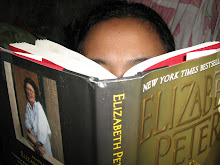"Sa bayan ng Baler, isang dapithapon
mayro'ng isinilang, isang magandang sanggol.
Siya ay lumaki, at naging marunong
Siya ay nabantog, Manuel L. Quezon..."
...with the name pronounced as "Manuel La Quezon," the way we were taught to say our abakadas when I was in Grade One.
When called upon to deliver a song or poem appropriate for the Linggo ng Wika, one or another of my elementary school classmates would always render that little ditty. I don't know who wrote it, or if there was anything more to it than just those four lines, but it always reminded us of one thing: on the same day, August 19, many years ago, a boy named Manuel Luis Quezon was born in Baler and grew up to be President of the country and the Father of the National Language (Ama ng Wikang Pambansa).
Establishing the national language is probably the thing we best remembered Quezon for, when I was younger back in the province. For a long time, we still thought of the national language as Tagalog that went by another name, a language foisted upon us by the powers that be in the capital. It is only now that I can appreciate having Filipino as the language I can use to communicate with everyone from Ivatan to Tausug. Quezon did have the right idea.
When I was writing the article about Manuel Luis Quezon for Wikipilipinas, I learned how much more there was to him than just the Father of the Language whose birthday we remembered every August with celebrations of our languages and our diverse cultures.
Manuel Luis Quezon was the first President of the Philippine Commonwealth. More than that, he was also considered the Father of the Country because of his efforts in lobbying for Philippine independence from America. An ardent nationalist, he was from many accounts a passionate and fiery man who cared about many things. He died before he could see his dream of an independent Philippines come true, but his efforts were not in vain.
"I would rather see the Philippines run like hell by Filipinos than run like heaven by the Americans, because no matter how bad a Filipino government might be, we can always change it," he once said. This statement has earned him a lot of flak recently because many commented cynically that he got what he wanted. Still, he did say we could always change a bad Philippine government by ourselves; a bad government that is not even ours would be harder to change. If, that is, we really want to change it.
Maligayang kaarawan po, Pangulong Quezon.
Five Dramas That Are My Equivalent Of Comfort Food, Part 2
-
So, yes, well. I've added to my "comfort dramas" list in the meantime. You
know which ones I'm referring to... the dramas you tend to go back and
rewatch w...
12 years ago











